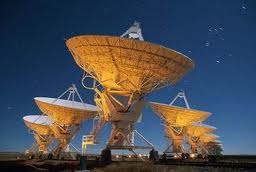 Some fifty years ago scientists calculated that there could be millions of advanced civilizations in our galaxy, and a search for them, called Search for Extraterrestrial Intelligence (SETI), began in earnest. Fifty years of failure followed. Politicians, having no liking for perpetual failure, cut off funding, and the astronomers recoiled in embarrassment, blaming it all on the vastness of space. There may or may not be other intelligent life out there, but, so it would seem, the aliens are not as abundant as originally predicted. Meanwhile, our early radio broadcasts have yet to travel outwards a mere hundred light years. Astronomers claim, however, that it is possible to detect life-bearing planets at vast distances across the galaxy. This is done via atmospheric analysis (detection of oxygen, smog, whatever) of the exoplanets, and it is already possible for us –still in the primitive stage of technological development– to perform such analysis. No, we are not currently performing this analysis on faraway planets, but our scientists say that the hold-up is only due to a lack of funding for a really huge space-based telescope, and not to a lack of scientific know-how. Consequently, advanced aliens living at great distances from us would have known, many thousands of years ago, that there was abundant life on our planet.
Some fifty years ago scientists calculated that there could be millions of advanced civilizations in our galaxy, and a search for them, called Search for Extraterrestrial Intelligence (SETI), began in earnest. Fifty years of failure followed. Politicians, having no liking for perpetual failure, cut off funding, and the astronomers recoiled in embarrassment, blaming it all on the vastness of space. There may or may not be other intelligent life out there, but, so it would seem, the aliens are not as abundant as originally predicted. Meanwhile, our early radio broadcasts have yet to travel outwards a mere hundred light years. Astronomers claim, however, that it is possible to detect life-bearing planets at vast distances across the galaxy. This is done via atmospheric analysis (detection of oxygen, smog, whatever) of the exoplanets, and it is already possible for us –still in the primitive stage of technological development– to perform such analysis. No, we are not currently performing this analysis on faraway planets, but our scientists say that the hold-up is only due to a lack of funding for a really huge space-based telescope, and not to a lack of scientific know-how. Consequently, advanced aliens living at great distances from us would have known, many thousands of years ago, that there was abundant life on our planet.
That is plenty of time (thousands of years of travel time) to send out a probe to investigate up close. Stationed in our solar system or nearby, the probe would be quick to pick up our radio broadcasts, and earlier, telescopically, might have detected intelligent life on this planet via sighting of the Great Wall of China, the Nazca Lines, or, still earlier, Nile-river irrigation in ancient Egypt. The probe, of course, would alert any alien spaceship –that happened to be in our sector of the galaxy– of the presence of intelligent life on this planet, whereupon the aliens could decide to pay us a personal visit. Alien arrival during historic or contemporary times is fully plausible, more plausible than at any time in the distant past because the emergence of intelligent life on a planet acts like a magnet, attracting the attention of curious aliens. One of the arguments that scientists use to debunk UFO sightings is that our planet has been around for more than four billion years, so the odds are extremely small that the aliens would just happen to arrive here during the few decades that we have technology. As we have just seen, that is bad thinking. With countless billions of planets out there, it is far more sensible to visit only the planets where your probes have already detected the presence of intelligent life. Scientists, however, also have valid objections to UFOs, so none of the above should be taken as permission to suspect that one or another UFO might be a real alien spaceship. Regardless of whether we have been visited or merely detected, the approach currently taken by our astronomers is illogical.
The very premise on which SETI astronomy is based –an abundance of intelligent life in the universe– implies that the aliens know we are here given that we have a relatively young planet in an old galaxy. Thus, the prolonged failure to pick up an alien signal becomes attributable to nothing more than the aliens wanting to leave us alone, and for the same reason there may never be a random signal coming our way. Instead of passive listening, an outward search for the telltale signs of a super-civilization might be a better strategy. Morten St. George is a book author, article writer, and founder of the Andean Sky God Website. He has written various alien-related articles including Sky God of the Andes and the Incas. For more detail visit: http://www.mortenstgeorge.info/sky-god-of-the-andes-and-the-incas.html.
Parker Collins




